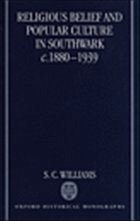This book challenges the domination of the institutional church as the overriding concern of nineteenth-century religious history by taking as its starting point the nature and expression of religious ideas outside the immediate sphere of the church within the wider arena of popular culture. It considers in detail how these beliefs formed part of a richly textured language of personal, familial, and popular identity in the day-to-day lives of the inhabitants of the London Borough of Southwark between c.1880 and the outbreak of the Second World War. The study highlights the persistence of patterns dismissed as alien to the industrial and urban environment. The interaction of folk idioms with institutional religious language and practice is also considered and urban popular religion is identified as a distinctive system of belief in its own right. This study also pioneers a methodology for exploring belief and interpreting it as a popular cultural phenomenon. A wide range of source materials are drawn on including oral history. Centrality is given to understanding the ways in which individuals expressed and communicated their religious ideas.
Review quote:
The author writes with notable clarity, tackling a complex subject with subtlety, and making judicious and entertaining use of 29 oral interviews with elderly inhabitants of south London ... Urban historians might well find the account of the Metropolitan Borough of Southwark in the second chapter of especial interest ... Subsequent chapters explore many fascinating issues. (Urban History)
This is an important book, especially in its determination to treat popular religion as a phenomenon in its own right ... Its picture of a vital, if eclectic, religious dimension to popular culture from within which the people interacted with the Churches largely on their own terms is a convincing one. (Journal of Ecclesiastical History)
Provides an impressive account of folk religion, carefully locating formal practice within a wider cultural context. There is much valuable detail here on the persistence of magic and fatalism. (Twentieth Century British History)
This book should be read by anyone with an interest in what ordinary people believe. It is relatively short, very readable, yet highly sophisticated in its analyses and its engagement with historiography. (Frances Knight, Theology)
This book considers the religious ideas, attitudes, and values of working people in the London Borough of Southwark between 1880 and 1939. It shows the persistence of folk beliefs usually assumed to have died out in the cities. It highlights the importance of religion in the daily life of the community and shows how orthodox and institutional expressions of belief were reinterpreted within local culture to form part of a distinctive pattern of urban popular religious belief.
Review quote:
The author writes with notable clarity, tackling a complex subject with subtlety, and making judicious and entertaining use of 29 oral interviews with elderly inhabitants of south London ... Urban historians might well find the account of the Metropolitan Borough of Southwark in the second chapter of especial interest ... Subsequent chapters explore many fascinating issues. (Urban History)
This is an important book, especially in its determination to treat popular religion as a phenomenon in its own right ... Its picture of a vital, if eclectic, religious dimension to popular culture from within which the people interacted with the Churches largely on their own terms is a convincing one. (Journal of Ecclesiastical History)
Provides an impressive account of folk religion, carefully locating formal practice within a wider cultural context. There is much valuable detail here on the persistence of magic and fatalism. (Twentieth Century British History)
This book should be read by anyone with an interest in what ordinary people believe. It is relatively short, very readable, yet highly sophisticated in its analyses and its engagement with historiography. (Frances Knight, Theology)
This book considers the religious ideas, attitudes, and values of working people in the London Borough of Southwark between 1880 and 1939. It shows the persistence of folk beliefs usually assumed to have died out in the cities. It highlights the importance of religion in the daily life of the community and shows how orthodox and institutional expressions of belief were reinterpreted within local culture to form part of a distinctive pattern of urban popular religious belief.
